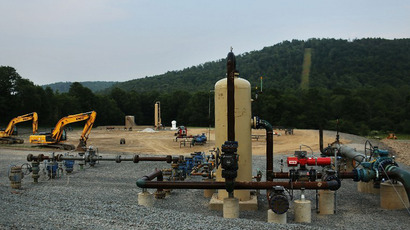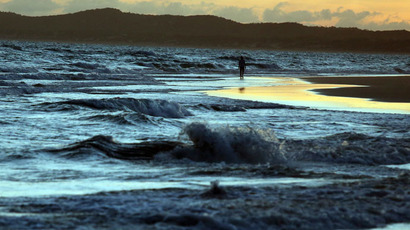Climate change could cost US $700 billion by year 2100 – report

If the United States and the world fail to adequately respond to climate change, a new report estimates Americans could be staring down tens of billions of dollars in damages annually, in addition to other negative economic consequences.
What’s more, the report claims, is that large swatches of the American landscape will become “unsuited for outdoor activity,” with heat waves resulting in more fatalities across the country.
The dire warnings emerged Tuesday in a comprehensive survey dubbed “Risky Business,” which projected the impact of global warming on the US economy. Chaired by former Treasury Secretary Hank Paulson and former New York City Mayor Michael Bloomberg, the bipartisan study hopes to bridge the political divide over the issue, focus climate change’s economic costs and rally business executives to the cause.
"It is time for all American business leaders and investors to get in the game and rise to the challenge of addressing climate change,” the report states, as quoted by Reuters.
According to the news service, the report found that due to hurricanes and other storms, the US could suffer annual property losses of $35 billion within the next 15 years. By the year 2050, somewhere between $66 billion and $106 billion in property could be submerged in water thanks to coastal flooding, and there’s a five percent possibility that those losses reach $700 billion by 2100.
The damage wouldn’t be limited to flooding, either. The report estimated that in some states, stronger heat waves could cause crop yields to decline up to 14 percent, a situation in which farmers face to lose billions of dollars. With air conditioning in high demand and fewer people working outside due to the heat, Americans could end up spending an additional $12 billion on utilities alone.
The cost would be high but necessary, as the report also found going outside could become a deadly proposition, particularly when high temperatures result in similarly high levels of humidity.
"As temperatures rise, toward the end of the century, less than an hour of activity outdoors in the shade could cause a moderately fit individual to suffer heat stroke," Rutgers University climatologist Robert Kopp, the lead scientific author of Risky Business, said in a separate story by Reuters. "That's something that doesn't exist anywhere in the world today."
With up to 52 additional days of “extremely hot” weather by 2050, it's estimated that anywhere between 11,000 and 36,000 additional people could die from the heat at current population levels.
The report arrives just a few weeks after US President Barack Obama outlined an ambitious plan to cut greenhouse gas emissions to 30 percent of 2005-era levels by the year 2030. As RT mentioned previously, the Environmental Protection Agency believes its “Clean Power Plan,” which will regulate existing power plants, will reduce emission levels, create jobs and cut household electricity bills by eight percent.
In the wake of this most recent study, the Huffington Post noted that White House officials are planning to meet with Paulson and other co-chairs to discuss the economic consequences, as well as "opportunities to overcome those risks.”
The president’s plan to reduce carbon dioxide emissions has been greeted with criticism from Republicans as well as the members of the energy industry, many of whom see its regulations as burdensome and as overreach by the government. The first wave set legal challenges was largely dismissed by the Supreme Court on Monday, which upheld the majority of the Environmental Protection Agency’s mandate to regulate carbon but exempted a select set of institutions.
Notably, the Risky Business study does not suggest any policy solutions for the problem at hand, with the authors intentionally avoiding to do so in order to sidestep the tricky political landmine that global warming has become.
"The whole point was to have a bipartisan group who agreed on the nature of the problem, which is that climate change is a huge economic risk," Paulson told the Wall Street Journal.
It’s not the first study to suggest the US would face severe consequences as a result of unmitigated climate change. Back in May, a report by the US Global Change Research Program stated America is already feeling the effects via longer droughts and more flooding – and that, barring action, the situation will only get worse moving forward.
"Climate change, once considered an issue for a distant future, has moved firmly into the present," the report stated. "Corn producers in Iowa, oyster growers in Washington state and maple syrup producers in Vermont are all observing climate-related changes that are outside of recent experience."














